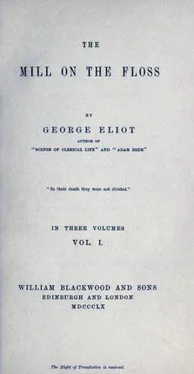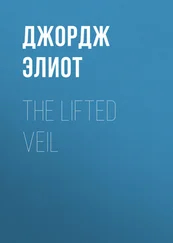Even Mrs. Glegg could not withhold her approval from Tom's words; she felt that the Dodson blood was certainly speaking in him, though, if his father had been a Dodson, there would never have been this wicked alienation of money. Maggie would hardly have restrained herself from leaping on Tom's neck, if her aunt Moss had not prevented her by herself rising and taking Tom's hand, while she said, with rather a choked voice:
"You'll never be the poorer for this, my dear boy, if there's a God above; and if the money's wanted for your father, Moss and me 'ull pay it, the same as if there was ever such security. We'll do as we'd be done by; for if my children have got no other luck, they've got an honest father and mother."
"Well," said Mr. Glegg, who had been meditating after Tom's words, "we shouldn't be doing any wrong by the creditors, supposing your father was bankrupt. I've been thinking o' that, for I've been a creditor myself, and seen no end o' cheating. If he meant to give your aunt the money before ever he got into this sad work o' lawing, it's the same as if he'd made away with the note himself; for he'd made up his mind to be that much poorer. But there's a deal o' things to be considered, young man," Mr. Glegg added, looking admonishingly at Tom, "when you come to money business, and you may be taking one man's dinner away to make another man's breakfast. You don't understand that, I doubt?"
"Yes, I do," said Tom, decidedly. "I know if I owe money to one man, I've no right to give it to another. But if my father had made up his mind to give my aunt the money before he was in debt, he had a right to do it."
"Well done, young man! I didn't think you'd been so sharp," said uncle Glegg, with much candor. "But perhaps your father did make away with the note. Let us go and see if we can find it in the chest."
"It's in my father's room. Let us go too, aunt Gritty," whispered Maggie.
Chapter IV. A Vanishing Gleam
Mr. Tulliver, even between the fits of spasmodic rigidity which had recurred at intervals ever since he had been found fallen from his horse, was usually in so apathetic a condition that the exits and entrances into his room were not felt to be of great importance. He had lain so still, with his eyes closed, all this morning, that Maggie told her aunt Moss she must not expect her father to take any notice of them.
They entered very quietly, and Mrs. Moss took her seat near the head of the bed, while Maggie sat in her old place on the bed, and put her hand on her father's without causing any change in his face.
Mr. Glegg and Tom had also entered, treading softly, and were busy selecting the key of the old oak chest from the bunch which Tom had brought from his father's bureau. They succeeded in opening the chest, — which stood opposite the foot of Mr. Tulliver's bed, — and propping the lid with the iron holder, without much noise.
"There's a tin box," whispered Mr. Glegg; "he'd most like put a small thing like a note in there. Lift it out, Tom; but I'll just lift up these deeds, — they're the deeds o' the house and mill, I suppose, — and see what there is under 'em."
Mr. Glegg had lifted out the parchments, and had fortunately drawn back a little, when the iron holder gave way, and the heavy lid fell with a loud bang that resounded over the house.
Perhaps there was something in that sound more than the mere fact of the strong vibration that produced the instantaneous effect on the frame of the prostrate man, and for the time completely shook off the obstruction of paralysis. The chest had belonged to his father and his father's father, and it had always been rather a solemn business to visit it. All long-known objects, even a mere window fastening or a particular door-latch, have sounds which are a sort of recognized voice to us, — a voice that will thrill and awaken, when it has been used to touch deep-lying fibres. In the same moment, when all the eyes in the room were turned upon him, he started up and looked at the chest, the parchments in Mr. Glegg's hand, and Tom holding the tin box, with a glance of perfect consciousness and recognition.
"What are you going to do with those deeds?" he said, in his ordinary tone of sharp questioning whenever he was irritated. "Come here, Tom. What do you do, going to my chest?"
Tom obeyed, with some trembling; it was the first time his father had recognized him. But instead of saying anything more to him, his father continued to look with a growing distinctness of suspicion at Mr. Glegg and the deeds.
"What's been happening, then?" he said sharply. "What are you meddling with my deeds for? Is Wakem laying hold of everything? Why don't you tell me what you've been a-doing?" he added impatiently, as Mr. Glegg advanced to the foot of the bed before speaking.
"No, no, friend Tulliver," said Mr. Glegg, in a soothing tone. "Nobody's getting hold of anything as yet. We only came to look and see what was in the chest. You've been ill, you know, and we've had to look after things a bit. But let's hope you'll soon be well enough to attend to everything yourself."
Mr. Tulliver looked around him meditatively, at Tom, at Mr. Glegg, and at Maggie; then suddenly appearing aware that some one was seated by his side at the head of the bed he turned sharply round and saw his sister.
"Eh, Gritty!" he said, in the half-sad, affectionate tone in which he had been wont to speak to her. "What! you're there, are you? How could you manage to leave the children?"
"Oh, brother!" said good Mrs. Moss, too impulsive to be prudent, "I'm thankful I'm come now to see you yourself again; I thought you'd never know us any more."
"What! have I had a stroke?" said Mr. Tulliver, anxiously, looking at Mr. Glegg.
"A fall from your horse — shook you a bit, — that's all, I think," said Mr. Glegg. "But you'll soon get over it, let's hope."
Mr. Tulliver fixed his eyes on the bed-clothes, and remained silent for two or three minutes. A new shadow came over his face. He looked up at Maggie first, and said in a lower tone, "You got the letter, then, my wench?"
"Yes, father," she said, kissing him with a full heart. She felt as if her father were come back to her from the dead, and her yearning to show him how she had always loved him could be fulfilled.
"Where's your mother?" he said, so preoccupied that he received the kiss as passively as some quiet animal might have received it.
"She's downstairs with my aunts, father. Shall I fetch her?"
"Ay, ay; poor Bessy!" and his eyes turned toward Tom as Maggie left the room.
"You'll have to take care of 'em both if I die, you know, Tom. You'll be badly off, I doubt. But you must see and pay everybody. And mind, — there's fifty pound o' Luke's as I put into the business, — he gave me a bit at a time, and he's got nothing to show for it. You must pay him first thing."
Uncle Glegg involuntarily shook his head, and looked more concerned than ever, but Tom said firmly:
"Yes, father. And haven't you a note from my uncle Moss for three hundred pounds? We came to look for that. What do you wish to be done about it, father?"
"Ah! I'm glad you thought o' that, my lad," said Mr. Tulliver. "I allays meant to be easy about that money, because o' your aunt. You mustn't mind losing the money, if they can't pay it, — and it's like enough they can't. The note's in that box, mind! I allays meant to be good to you, Gritty," said Mr. Tulliver, turning to his sister; "but you know you aggravated me when you would have Moss."
At this moment Maggie re-entered with her mother, who came in much agitated by the news that her husband was quite himself again.
"Well, Bessy," he said, as she kissed him, "you must forgive me if you're worse off than you ever expected to be.
But it's the fault o' the law, — it's none o' mine," he added angrily. "It's the fault o' raskills. Tom, you mind this: if ever you've got the chance, you make Wakem smart. If you don't, you're a good-for-nothing son. You might horse-whip him, but he'd set the law on you, — the law's made to take care o' raskills."
Читать дальше












